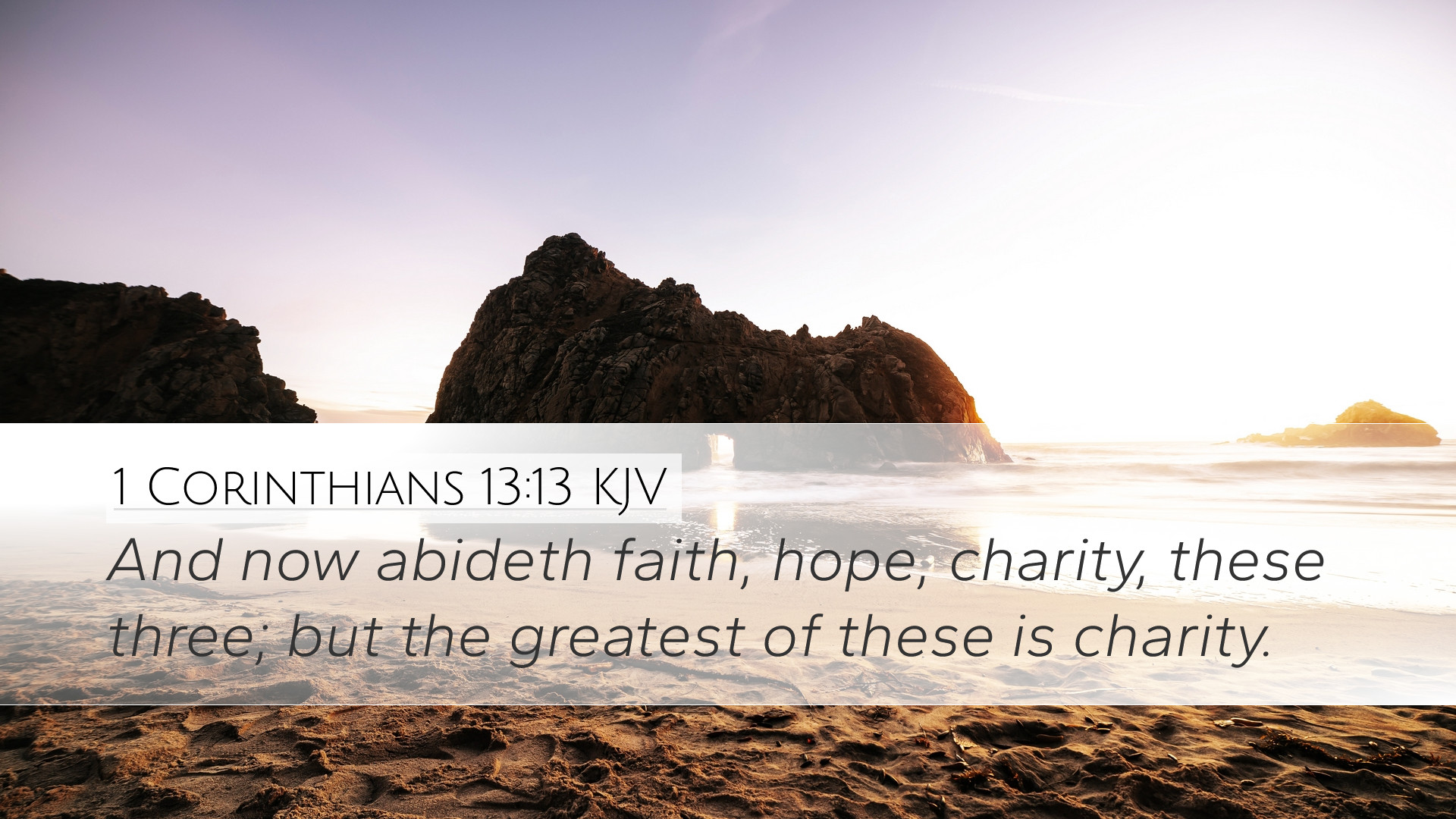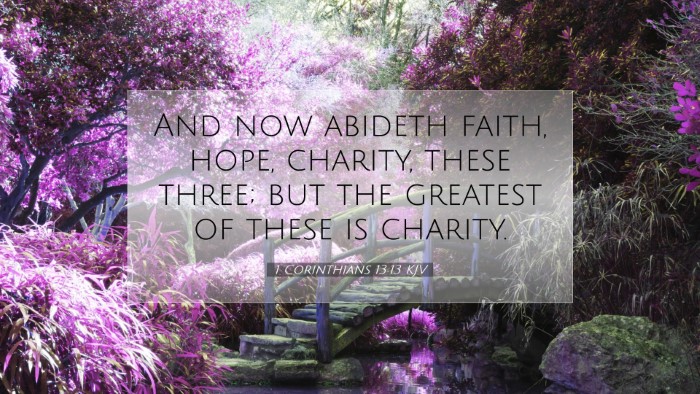Old Testament
Genesis Exodus Leviticus Numbers Deuteronomy Joshua Judges Ruth 1 Samuel 2 Samuel 1 Kings 2 Kings 1 Chronicles 2 Chronicles Ezra Nehemiah Esther Job Psalms Proverbs Ecclesiastes Song of Solomon Isaiah Jeremiah Lamentations Ezekiel Daniel Hosea Joel Amos Obadiah Jonah Micah Nahum Habakkuk Zephaniah Haggai Zechariah Malachi1 Corinthians 13:13
1 Corinthians 13:13 KJV
And now abideth faith, hope, charity, these three; but the greatest of these is charity.
1 Corinthians 13:13 Bible Commentary
Commentary on 1 Corinthians 13:13
Verse: "And now abide faith, hope, love, these three; but the greatest of these is love." (1 Corinthians 13:13)
Introduction
This verse serves as the concluding statement of Paul's discourse on love in his first letter to the Corinthians. It encapsulates the essence of Christian virtues and emphasizes the supremacy of love above all other gifts and qualities, making it a profound theological cornerstone.
Exegesis of the Text
Paul's letter addresses the challenges of disunity and immaturity among the Corinthian believers. In this context, faith, hope, and love are presented as enduring qualities within the Christian experience.
- Faith: Faith in God and His promises is foundational for the Christian life. It is the belief that undergirds our relationship with God and provides hope and assurance.
- Hope: Hope represents the confident expectation of future glory and fulfillment in Christ. It sustains believers through trials and encourages perseverance.
- Love: Love is portrayed not merely as an emotion but as an active commitment to others, reflecting God's nature. It is the highest expression of God's character and the ultimate fulfillment of the law.
Theological Insights
This verse highlights a triad of virtues central to Christian practice, inviting believers to reflect on their significance:
- Faith: As Albert Barnes notes, faith is essential for the believer, serving as the means through which grace is appropriated and life is sustained.
- Hope: Hope is significant as it anchors the soul, providing stability amid life's uncertainties. Adam Clarke posits that hope encourages a believer to focus on God’s promises and future grace.
- Love: Matthew Henry emphasizes that love is the greatest because it embodies the essence of the Christian commandments—loving God and neighbor. It is the ultimate evidence of genuine faith.
The Greatest of These is Love
Paul’s declaration that love is the greatest among these virtues sparks important discussions among theologians regarding the nature and practice of love:
- Supremacy of Love: Love is more than an emotion; it is an action that embodies sacrifice, humility, and service. It reflects the character of Christ and is integral to the life of a Christian. Albert Barnes asserts that love surpasses other virtues in permanence and potency.
- Love as a Fulfillment: This love is the fulfillment of the law and prophetic vision. It encapsulates the totality of a believer's duty and reflects the heart of the Gospel. Adam Clarke asserts that the promotion of love is the ultimate aim of Christian teaching.
- Lasting Impact: The transient nature of spiritual gifts (1 Corinthians 13:8) is contrasted with the enduring qualities of faith, hope, and love, particularly love which continues into eternity.
Pastoral Applications
This verse encourages various practical applications for pastors and church leaders:
- Preaching Love: Emphasize love as the hallmark of Christian life in sermons and teachings, focusing on how love should manifest in relationships within the church and community.
- Encouraging Unity: Motivate congregations to practice love to combat disunity as demonstrated within the Corinthian church. Love acts as a unifying force amid diversity.
- Nurturing Spiritual Growth: Foster environments where faith and hope can flourish through acts of love, encouraging members to engage in service and outreach.
Conclusion
In summary, 1 Corinthians 13:13 presents a powerful theological statement about the enduring nature of faith, hope, and love, with love at its core. For the believer, understanding the richness of this triad and the supremacy of love can transform personal faith and communal relationships, leading to a greater reflection of Christ in the world.


